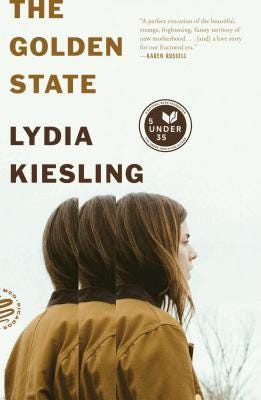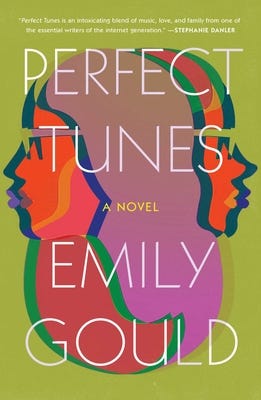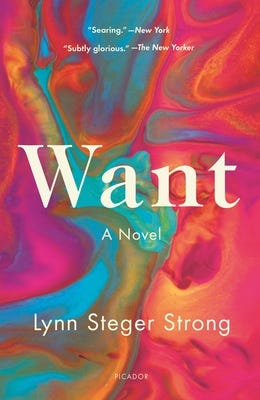Today is an obvious occasion to spend a little time thinking about books and mothers.
As I get older, I am ever more grateful for my mother, not just that she’s still around and we will be able to Zoom with her as a family this afternoon, but for everything she did to put me on the trajectory to the life I’ve lived.
My experience of my mom’s motherhood is pretty straightforward. For sure we had our moments of conflict and strife, but always, there was my mother as a source of security, of solace. This is true to this day. I try not to take this for granted, and yet, it’s been such a constant presence, it’s often hard not to take it for granted, in the same way I don’t often give thanks for the gravity that holds me to the Earth.
But my mom’s experience of motherhood is far more complicated than I will ever know, or, and here’s the most important part, more complicated than I will ever want to know. The narrative I experience is clear, I have a mother who has always loved and cared for me.
Thankfully, we have narratives of motherhood that allow me, as a foreigner to motherhood, to experience at least some appreciation for the complexities of what it means to be someone’s mother.
When I started thinking about books and mothers, a trio of books released in the last several years leapt to mind almost instantly for their ability to put the reader deep inside the experience of motherhood among the white educated class in the United States in the 21st century, the class to which I was very fortunate to be born into in the last quarter (or so) of the 20th century.
When Lydia Kiesling’s The Golden State came out in 2018, I gave it one of my “Biblioracle Book Awards” for “Most Mesmerizing Book of the Year.” The entire present action of the novel takes place over the course of a week to ten days as Daphne, a mother to a young child, flees San Francisco to go to a mobile home in the California desert left to her by a deceased relative. Daphne is single parenting because her Turkish husband is trapped out of the country because of visa problems, and the strain of work and parenting has tipped her into crisis.
The mesmerizing parts of The Golden State are Kiesling’s renderings of the day to day, even moment to moment work of caring for a small child. The child (Honey) is an omnipresence in Daphne’s life by both desire and necessity. Honey is simultaneously what keeps Daphne tethered to a need to keep her life together, and the thing that may drive Daphne over the edge. Kiesling develops this tension through close and careful observation of the nuts and bolts of taking care of someone who needs you every moment of the day. Kiesling develops a plot around some of the folks Daphne meets in the desert, but for me, the most riveting parts of the book are her renderings of what from the outside seems like it must be mundane, the feeding, the changing of diapers, the quest for sleep.
It was a very powerful reading experience for this non-mother.
In our culture, mothers are expected to sacrifice themselves for their children, a notion that is simultaneously noble, and as we say these days, problematic. Emily Gould’s Perfect Tunes tells the story of Laura, a young and talented singer-songwriter who has a child from a brief and tumultuous romance with a doomed young musician. The bulk of the novel is set when that child, Marie, is fifteen years old, and we see that Laura has built a loving and stable home for them, but that this effort has indeed required her to sacrifice her earlier dreams of being a musical artist.
While told in a somewhat breezier register than The Golden State, similar to that book, Perfect Tunes is an exploration of the liminal space a mother occupies when they have hopes and dreams as an individual that are at odds or incompatible with their responsibilities as a mother. What’s interesting about Laura’s perspective is that she bears little to no resentment of Marie or regret of the life she’s chosen. Some part of her has been thwarted by her responsibilities to her child, but other parts of her flourish because of it.
Rather than falling into a “you can’t have it all” trope that puts these things in strict antagonism, Gould is more interested in the question of “What can you have, and when?” Our choices ripple throughout our lives, and Gould explores the consequences of those ripples to great effect.
At times, Want by Lynn Steger Strong reads like a horror story. For example, I gasped at this line from the narrator, Elizabeth, married mother of two with a PhD, employed as an adjunct professor, “My husband still owed more than a hundred grand in student loans from undergrad.”
Elizabeth and her husband did everything “right.” They worked hard, got educations, got married, had children, and yet they are also declaring bankruptcy, overwhelmed by the impossibility of living what we once called the American Dream. It is a rendering of the precarity that the generations younger than me have been forced into in the pursuit of that dream because of the obstacles our societal structure has placed in their way.
The “wants” implied by the title are nothing extraordinary, love, security, connection, but achieving these things seems almost impossible given those obstacles.
Had she been born at a different time, Elizabeth would have been on the trajectory for the life of safety and security that I took for granted as a child of two college-educated parents in the latter part of the previous century. But because she has had the bad fortune of following this path after the cost of an education became prohibitive, after the collapse of full-time tenured employment in academia, she is broke and increasingly broken.
But she is also driven and persistent, and it is her motherhood that fuels much of that drive, even as her status as a mother that has made the economics of her life so punishing.
The book is both emotionally moving, and sort of infuriating as a portrait of how we’ve pulled up the ladder of success a little bit for each successive generation until it has become almost impossible to reach.1
It seems strange to write a column about mothers without acknowledging the impending demise of the legal right of women to choose whether or not they want to be a mother. It’s like these folks have been reading The Handmaid’s Tale as an instruction manual, rather than a dystopian nightmare.
I don’t imagine it has ever been easy to be anyone’s mother, but this is a deliberate act to make it even harder, a direction the books I highlight above make it clear we’ve already been moving.
To me, it is a sign that we revere “motherhood” in the abstract far more than the complicated humans who are mothers in the specific.
Links
My Chicago Tribune column this week is about books that are the inverse of the “comfort food” books I wrote about previously, satires which seek to mine the absurdity of what it is to be human and provoke more than comfort.
Speaking of comfort reads, I have to point folks towards this list compiled by newsletter reader Marianne Goss of “Feel good fiction with substance.” Serious novels need not be depressing, and Marianne’s list has enough wonderful selections to last a literal lifetime.
The New York Times has a fascinating look at a new generation of young book collectors who are shaking up the industry.
Speaking of the New York Times, over at the Nation, Kyle Paoletta does a deep analysis of what has been missing from the coverage and criticism in recent years as the New York Times Book Review undergoes a transition to new editorship
Buzzfeed has some books that it claims will have you sprinting to the nearest bookstore.
Over at LitHub, Marc Lamont Hill and Todd Brewster look at how James Baldwin’s work has led to Baldwin becoming a “21st century influencer.” It’s an excerpt from Hill and Brewster’s new book, Seen and Unseen: Technology, Social Media, and the Fight for Racial Justice.
Recommendations
All books linked here are part of The Biblioracle Recommends bookshop at Bookshop.org. Affiliate income for purchases through the bookshop goes to Open Books in Chicago.
Broke the century mark in affiliate income ($106.20) for the year this week, nice!2
1. My Life in Middlemarch by Rebecca Mead
2. Afternoon Men by Anthony Powell
3. Charlie Chan Carries On by Earl Derr Biggers
4. Stepsons by Robert Liddel
5. Fortunes of War: The Levant Trilogy by Olivia Manning
Rick P. - Chicago IL
Rick is obviously highly familiar with classic 20th century literature, but hopefully I can recommend a book he hasn’t read. I’m going with one of my all-time favorites, The Clown by Heinrich Boll.
If you snoozed on this made-up holiday and need a last minute gift, may I make a suggestion of a gift subscription to this very newsletter?
Happy Mother’s Day to all those who celebrate, and to those who do not, I hope all this talk about mothers has not been too painful or annoying.
I’ll see you all next week.
JW
The Biblioracle
As someone who fell on the fortunate side of that generational divide, I feel a certain obligation to speak out about these injustices. Elsewhere this week I challenged those who say that any action on reducing student loan debt must be means tested to consider applying an “age test” instead to account for those of us who were able to secure our educations before the cost was so high.
I’ll match affiliate income up to 5% of annualized revenue for the newsletter, or $500, whichever is larger.







As always, an excellent newsletter full of recommendations and excellent ties to current events happening right now. Thank you!
Thumbs up on the Kiesling. I'm going to look into Perfect Tunes. Meanwhile, Helen Phillips' _The Need_ comes to mind when I think of books about mothers from the past few years. Great use of horror, suspense, and sci-fi to tackle themes of mothering.